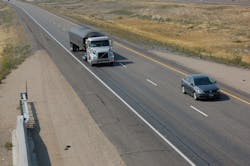While even truckers who support the idea of a speed limiter mandate point to serious flaws in the Dept. of Transportation’s first go at a proposal, the main objection coming from safety groups is that the rulemaking has taken so long.
Road Safe America, a truck-focused highway safety organization, worked with American Trucking Assns. on the initial petition. In its comment, RSA expresses “extreme frustration” that it’s been a decade since that petition was filed.
“In the ensuing years, over a million American motorists have been injured or killed in crashes involving big-rigs. Since 2009, truck crashes have increased 44%, injuries have increased 50% and deaths went up 20%,” RDA writes. “Many of these crashes could have been avoided with such a common sense rule applied to existing, not just new, trucks, for which we have advocated for so long, along with many safe trucking companies, trucking organizations and all safety advocates.”
RSA supports the 60 mph speed setting as the effective for reducing crashes and saving lives—and RSA discounts any objection based on speed differentials.
“We find that argument to be hollow since it is totally based on the assumption that all vehicles drive the same speed (whatever the speed limit is) now on our highways…a total fallacy,” RSA says, noting that vehicles can be observed going 50 mph in the right lane and 100 mph+ in the left. “So the fact is, we all deal with huge speed differentials now. That is a reality.”
Additionally, RSA cites research that shows 77% of trucks already use speed limiters voluntarily, “we have not observed any of the problems OOIDA says will occur.”
The comment filed jointly by the Truck Safety Coalition (TSC), Citizens for Reliable and Safe Highways (CRASH), and Parents Against Tired Truckers (PATT) also calls for a 60 mph setting for all trucks, saying that only requiring speed limiters for new trucks is “illogical.”
The comment explains the technology is already installed on most trucks, so the DOT should stop “slow-walking” the proposal.
“Unfortunately, the NPRM only applies the set speed requirement to new trucks and does not identify the speed at which the limiters will be capped,” the coalition says. “As agencies with missions to promote safety, NHTSA and FMCSA cannot ignore the fact that large trucks take longer to stop than passenger vehicles and transfer much more kinetic energy upon impact. This is why the agencies must address these glaring deficiencies as they will greatly blunt the potential safety benefits of this rule.”
Additionally, the comment rejects the argument that speed differentials pose a safety hazard, citing the “multitude” studies that show the safety benefits “far outweigh the potential dangers.”
“Ten years is too long of a time for any rule, especially one requiring technology that has been standard in most trucks since the 1999,” the collation comment concludes. “It is long past due for the United States to catch up to other leading countries on the implementation of speed limiting technology.”
The comment from Advocates for Highway and Auto Safety cites the same truck crash statistics, makes many of the same points, and comes to the same conclusion.
“While Advocates supports this long overdue rulemaking, the speed limiting devices must be set at 60 mph and all commercial motor vehicles, including those already in the vehicle fleet, must be required to be equipped with this technology in order for this proposed regulation to realize the optimal safety benefits,” the organization writes, calling the safety benefits of setting the speed at 60 MPH “indisputable.”
The comment docket also includes a Care2 petition signed by 601 citizens in support of the rulemaking. Along with signatures, the petition includes brief comments such as “A common sense rule that can save lives. Please make this happen!” and “Requiring all big rigs to slow down in order to SAVE LIVES is a no brainier! (sic)”
A number of comments were filed by family members of truck crash victims. Tammy Huffman writes that her brother-in-law was an Arizona State Trooper who was killed in a truck crash.
“These Semi vehicles are potential "life enders" going down our road ways, unchecked,” she says. “Government's job is to protect the citizens. Our Government is FAILING! Something needs to be done. Government cannot just stand by and let this go unchecked. In NO other industry would Government stand by and allow a 40% increase [in truck crashes]. … This is the only industry I can see that runs completely amuck and has NO checks and balances. This needs to stop!”
About the Author
Kevin Jones 1
Editor
Kevin has served as editor-in-chief of Trailer/Body Builders magazine since 2017—just the third editor in the magazine’s 60 years. He is also editorial director for Endeavor Business Media’s Commercial Vehicle group, which includes FleetOwner, Bulk Transporter, Refrigerated Transporter, American Trucker, and Fleet Maintenance magazines and websites.
